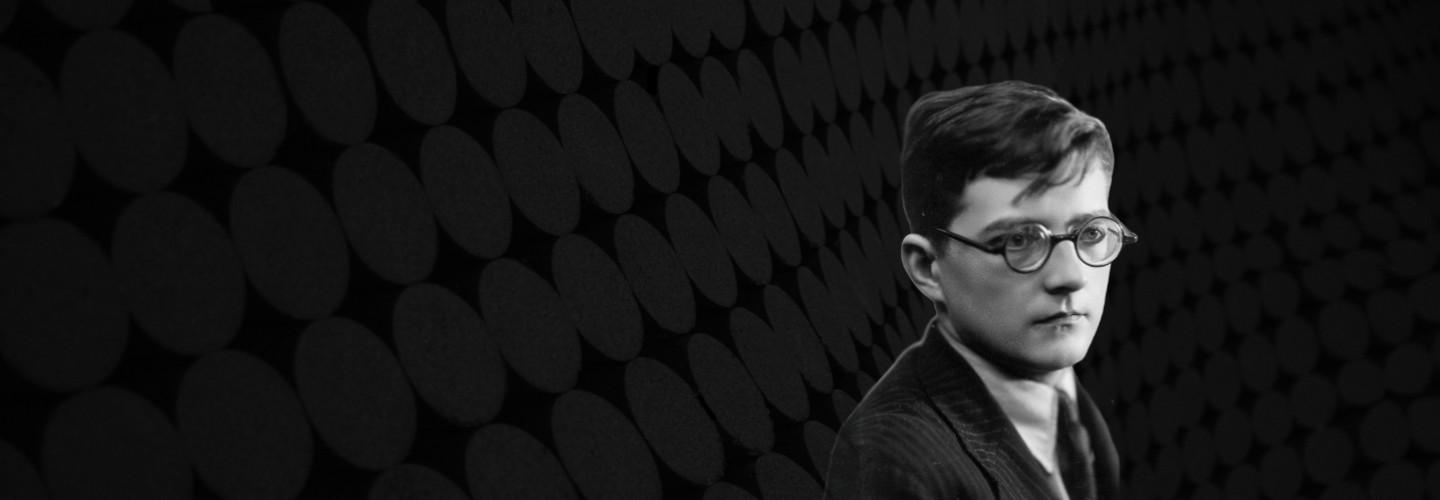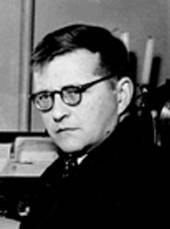
Works by Dmitri Schostakowitsch
Biography
1906 – Dmitri Schostakowitsch was born on 25th September in Petersburg.
1915 – first piano lessons– studies with his mother and as of autumn he attends the music school.
1917 – The young composer witnesses the shooting of a worker. First compositions.
1919–1925 – attends the Petrograd Music Conservatory. Scherzo for orchestra op. 1 (1919).
1922 – after his father’s death the family has financial difficulties, Schostakowitsch is granted a scholarship.
1923 – the composer comes down with tuberculosis and has to undergo surgery. After his recovery he works as pianist in a silent movie theatre. Puts finishing touches to his 1st Symphony, which he completes in 1925 (world premiere in 1926).
1927 – Schostakowitsch meets Alban Berg. He works as musical adviser and pianist at the theatre in Moscow. Starts to compose the opera The Nose; 2nd Symphony; first soundtrack to the silent movie The new Babylon.
1929 – works at the Leningrad ‘Theater der Arbeiterjugend’. 3rd Symphony (world premiere in 1930).
1930 – world premiere of The Nose- after 15 performances the work disappears in the following 44 years from the repertoire of Soviet theatres. Opera Lady Macbeth of Mzensk (world premiere in 1934).
1932 – Elected into the board of directors of the Leningrad section of the Soviet Composers’ Union. Marries Nina W. Warsar. 24 Préludes for piano (world premiere in 1933).
1933 – Concert for piano, trumpet and string orchestra op. 35.
1935 – Stalin leaves during a performance of Lady Macbeth in Moscow. 4th Symphony (world premiere in Moscow in 1961).
1936 – his daughter Galina is born. By order of the Central Committee of the Communist Party the work Lady Macbeth and the ballet Der helle Bach were fiercely attacked in the newspaper Prawda.
1937 – Schostakowitsch holds a teaching post at the Leningrad Music Conservatory. 5th Symphony.
1938 – his son Maxim is born. 1st String Quartet.
1939 – appointment as professor. 6th Symphony.
1940 – he is awarded the order of the ‘Red Banner’. Piano Quintet.
1941 – Stalin declares war. Schostakowitsch tries in vain to be drafted into the Red Army. Evacuation to Kuibyschew. Leningrad Symphony (7th Symphony) composed in commemoration of Lenin (world premiere in 1942).
1942 – is awarded the Stalin Prize for the 7th Symphony.
1943 – 8th Symphony.
1944 – Return to Leningrad. Trio nr. 2 for piano, violin and violoncello nr. 2; 2nd String Quartet.
1945 – 9th Symphony, by which Stalin is disappointed because of the lack of monumentality.
1946 – is awarded the Stalin Prize for the Trio nr. 2.
1947 – teaching post at the Leningrad Music Conservatory. Receives the Lenin Order.
1948 – The 7th, 8th and 9th Symphonies also get negative reviews. Schostakowitsch resigns the teaching position. 1st Violin Concert (world premiere in Leningrad in 1955).
1949 – Trip to New York as delegate at the Pan–American Conference for Culture and Peace- because of anti–communist demonstrations he departs soon. Oratorio Das Lied von den Wäldern.
1950 – attends the World Peace Conference in Warsaw.
1951 – Completion of 24 Preludes and Fugues; 10 Poems for choir a cappella (world premiere in Moscow).
1952 – attends the World Peace Conference in Vienna. Stalin Prize for 10 Poems.
1953 – Stalin’s death– Nikita Chruschtschow introduces a phase of intellectual liberalisation. 10th Symphony (world premiere in Leningrad).
1954 – Schostakowitsch is named the ‘People’s Artist of the USSR’. His wife Nina dies of cancer.
1956 – marries the teacher Margarita Andrejewna Kainowa. 6th String Quartet (world premiere in Leningrad).
1957 – appointed secretary of the Composers’ Union of the USSR (until 1968). 2nd Piano Concert (world premiere in Moscow); 11th Symphony (world premiere in Moscow).
1958 – His reputation is fully restored by the Central Committee of the Communist Party of the USSR. Divorce from Margarita Andrejewna Kainowa. Operetta Moscow-Cheriomushki.
1959 – Schostakowitsch suffers from a chronic disease of the spinal cord with symptoms of paralysis. 1st Concert for violoncello and orchestra op. 107 (world premiere in Leningrad).
1960 – elected 1st secretary of the Composers’ Union of the USSR, joins the Communist Party. Admission to sanatorium. 7th and 8th String Quartet (world premiere in Leningrad); 12th Symphony (world premiere in 1961).
1961 – in hospital from January to February.
1962 – elected deputy of the Supreme Soviet of the USSR. Marries Irina Antonowna Supinskaja. 13th Symphony (world premiere in Moscow).
1964 – Schostakowitsch Festival in Gorki. 9th and 10th String quartet (world premiere in Moscow); The execution of Stepan Rasin (world premiere in Moscow).
1966 – stays several months in hospital due to a heart attack. Birthday anniversaries in the entire Soviet Union in honour of the composer’s 60th birthday. Receives the medal of ‘Hero of Socialist Work’. 11th String quartet (world premiere in Leningrad); 2nd Concerto for violoncello and orchestra (world premiere in Moscow).
1967 – permanent walking impairment after breaking his leg. 2nd Violin concerto (world premiere in Moscow).
1969 – again several months in hospital. 14th Symphony (world premiere in Moscow).
1971 – Another heart attack. Is awarded the Order of the October Revolution. 15th Symphony (world premiere in Moscow in 1972).
1974 – elected deputy of the Supreme Council of the USSR. 15th String quartet (world premiere in Leningrad). Glinka State Prize for the choir cycle Die Treue as well as for the 14th String quartet.
1975 – Dmitri Schostakowitsch dies of a heart attack on 9th August in Moscow.
Links
www.shostakovich.org/

